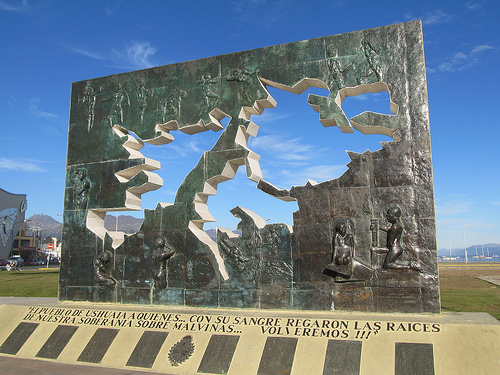Thirty years after Argentinian troops landed in the Falkland Islands on 2 April, 1982, Argentina remembers the beginning of a war for the sovereignty of the Islands that left 649 Argentinians dead.
The Voces Escritas [es] (Written Voices) website provides a summary of the statistics:
En total, fueron 649 argentinos los que dejaron la vida en Malvinas durante la guerra, y hubo 1188 heridos. Pero las consecuencias continuaron: más de 500 excombatientes se suicidaron en los años posteriores a la guerra, en medio de la indiferencia de la sociedad, y el abandono de los gobiernos democráticos.

Monument the those who fell in the Falklands War. Ushuaia, Argentina. image from Flickr user Jorge Andrade. used under licence (CC BY 2.0)
There were also British casualties. El Malvinense [es] conducted an investigation which has been updated and has finally released a statistic for the casualties from Great Britain and the loss of military resources suffered:
Total caidos: 1029 (estimados)
Total buques dañados o perdidos: 31
Total aeronaves perdidas: 45
Gran Bretaña nunca declaró el verdadero numero de bajas de sus tropas ni la pérdida de numeroso armamento. Queda demostrado el gran daño sufrido, que supera ampliamente al que recibió Argentina.
Total deaths: 1,029 (estimated)
Total vessels damaged or lost: 31
Total aircraft lost: 45
Great Britain never declared the true quantity of loss to troops or weapons. This goes to show the great damaged suffered, that far exceeds that received by Argentina.
On the other hand, the blog Diálogos [es], in a special post by Marcos Brincci, publishes alternative statistics:
La guerra no se olvida, aquellos 74 días desde el 2 de abril de 1982 dejan la honra por los casi 650 argentinos y unos 250 británicos muertos. Las Malvinas tienen vestigios de aquellos terribles días.
In Argentina on April 2, President Cristina Fernandez de Kirchner led a ceremony to mark the 30th anniversary of the Falklands War. The official news agency Telam [es] has published part of her speech:
“es una injusticia en pleno siglo XXI todavía subsistan enclaves coloniales como los que tenemos aquí, a pocos kilómetros de distancia”, en referencia a las Islas Malvinas.
She then remarks:
“de los 16 enclaves coloniales que existen en el mundo, diez de ellos son del Reino Unido” y afirmó que “resulta absurdo pretender el dominio” sobre las islas.
The BBC also writes about the president's speech and transcribes the words of David Cameron, the British Prime-Minister.
Britain remains staunchly committed to upholding the right of the Falkland Islanders, and of the Falkland Islanders alone, to determine their own future.
On Twitter, Falklands Island Gov (@falklandsgov) reflects on the date:
Today is a day for reflection rather than celebration. 30 years on, we are proud to see such strong support for the Islands across the world
During the weekend prior to April 2, the hashtag #MalvinasArgentinas [es] (Argentina Falklands) became a local trending topic.
Gwaa (@TheNorthGwaa) [es] writes:
Si no hubieran encontrado petróleo en
#MalvinasArgentinas no estarían pidiendo la intervención de la ONU para renegociar las tierras.
At the same time, Francisco Angulo (@fran_spg) [es] disapproves of the chants from the crowds during football matches during the weekend:
#MalvinasArgentinas Está bien recordar a los ex combatientes, pero todo un estadio cantando “El que no salta es un inglés” me da escalofríos
On the other hand, Marcelo P (@my_silver10) [es], criticises the current government:
Todo esto de
#MalvinasArgentinas es un circo de Cristina para distraer de la#Inflacion, la#Inseguridad y las politicas Argenzuelisticas
Also via Twitter, Natalia Rodriguez (@manatu15) [es], quotes some lyrics from a song by renowned Argentinian singer-songwriter Atahualpa Yupanqu‘s [es], with reference to the Falkland Islands:
Seguirán las mil banderas del mar, azules y blancas, pero queremos ver una sobre tus piedras clavada. (A. Yupanqui)
#MalvinasArgentinas
The Defonline [es] webpage provides a transcript of a discussion with Martin Balza, former chief of the Argentinian military and Falklands War veteran who was present throughout the conflict. With regard to the diplomacy between Argentina and Great Britain and in response to the question “should the Kelpers [islanders] also take part in negotiations?”, Balza states that:
No estoy de acuerdo en absoluto cuando alguien dice que se deben respetar los deseos de los isleños. Sí se deben respetar sus intereses: forma de vida, propiedades, idioma, religión, etc. Los ingleses no respetaron los deseos de los argentinos en 1833. Además, por expresa disposición de las Naciones Unidas, sobre todo a partir de 1965 con el Comité de Descolonización, en el caso Malvinas no rige el Principio de Autodeterminación de los Pueblos, que atañe a los pueblos originarios. En Malvinas se echó a los que estaban y se implantó a los que están.
However, Roger Edwards, a resident of the Falkland Islands and a veteran of the war in 1982, comments in The Guardian:
The Falkland Islanders are a peaceful, hard-working and resilient people. Our society is thriving and forward-looking. All we ask is to be left in peace to choose our own future, and responsibly develop our home for our children and generations to come. We would ask, particularly of those who take it upon themselves to comment from a standpoint of ignorance on our future, that our rights, and our points of view, and above all our wishes are respected and considered as enshrined in the UN charter.
Among the complaints, articles, netizen reactions and protests, Adrian Bono (@AdrianBono) [es] inquires:
Mientras en Argentina es trending topi c
#MalvinasArgentinas, en Twitter Gran Bretaña el tema ni aparece. ¿Queda claro, no?







3 comments